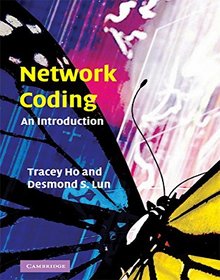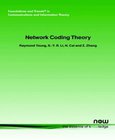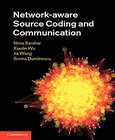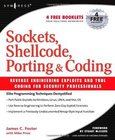Network Coding
An Introduction

Book Details:
| Publisher: | Cambridge University Press |
| Series: | Cambridge University |
| Author: | Tracey Ho |
| Edition: | 1 |
| ISBN-10: | 052187310X |
| ISBN-13: | 9780521873109 |
| Pages: | 184 |
| Published: | Apr 14 2008 |
| Posted: | May 07 2017 |
| Language: | English |
| Book format: | |
| Book size: | 1.2 MB |
Book Description:
Network coding promises to significantly impact the way communications networks are designed, operated, and understood. This book presents a unified and intuitive overview of the theory, applications, challenges, and future directions of this emerging field, and is a must-have resource for those working in wireline or wireless networking. Uses an engineering approach - explains the ideas and practical techniques Covers mathematical underpinnings, practical algorithms, code selection, security, and network management Discusses key topics of inter-session (non-multicast) network coding, lossy networks, lossless networks, and subgraph-selection algorithms Starting with basic concepts, models, and theory, then covering a core subset of results with full proofs, Ho and Lun provide an authoritative introduction to network coding that supplies both the background to support research and the practical considerations for designing coded networks. This is an essential resource for graduate students and researchers in electronic and computer engineering and for practitioners in the communications industry.
Download Link:
Related Books:
Network Coding Theory
Network Coding Theory provides a tutorial on the basic of network coding theory. It presents the material in a transparent manner without unnecessarily presenting all the results in their full generality. Store-and-forward had been the predominant technique for transmitting information through a network until its optimality was refuted by network coding theory. Network coding offers a new paradigm for network communications and has generated abundant research interest in information and coding theory, networking, switching, wireless communications, cryptography, computer science, operations research, and matrix theory. The tutorial is divided into two parts. Part I is devoted to network coding for the transmission from a single source node to other n...
Network-aware Source Coding and Communication
An introduction to the theory and techniques for achieving high quality network communication with the best possible bandwidth economy, this book focuses on network information flow with fidelity. Covering both lossless and lossy source reconstruction, it is illustrated throughout with real-world applications, including sensor networks and multimedia communications. Practical algorithms are presented, developing novel techniques for tackling design problems in joint network-source coding via collaborative multiple description coding, progressive coding, diversity routing and network coding. With systematic introductions to the basic theories of distributed source coding, network coding and multiple description coding, this is an ideal self-contained ...
Sockets, Shellcode, Porting & Coding
Reverse Engineering Exploits and Tool Coding for Security Professionals
The book is logically divided into 5 main categories with each category representing a major skill set required by most security professionals:1. Coding - The ability to program and script is quickly becoming a mainstream requirement for just about everyone in the security industry. This section covers the basics in coding complemented with a slue of programming tips and tricks in C/C++, Java, Perl and NASL. 2. Sockets - The technology that allows programs and scripts to communicate over a network is sockets. Even though the theory remains the same - communication over TCP and UDP, sockets are implemented differently in nearly ever language. 3. Shellcode - Shellcode, commonly defined as bytecode converted from Assembly, is utilized to execute command...
2007 - 2021 © eBooks-IT.org



